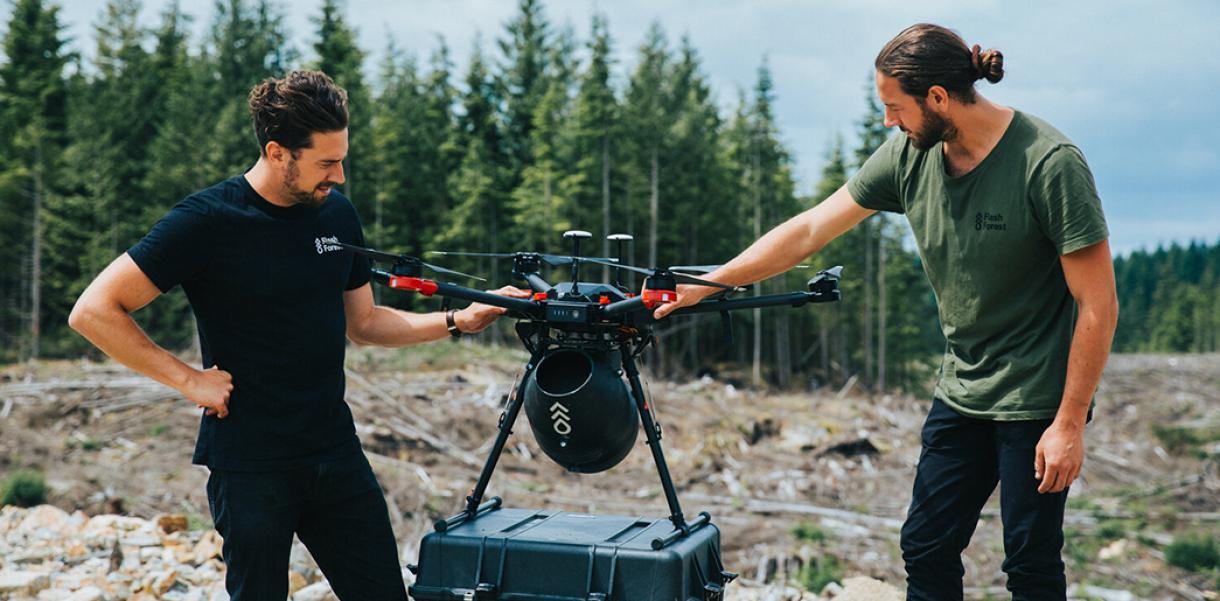How do we sustain life on this planet, when our Earth is fastly losing its breath?
Wildlife, plants and trees are dying out at rapid speed due to altering climates, wildfires, floods and human interference through farming, drilling and felling. Over the past 50 years, 17% of the Amazonian rainforest has been destroyed. In 2020 alone, we lost 12 million hectares of trees, including 4.2 million hectares of until now undisturbed tropical forests. Biodiversity loss globally is at its ultimate worst.
For centuries we’ve relied on our forests to ensure livelihood, safety and health for humans. This decade, our forests truly depend on us to save them – to rebuild ecosystems, increase biodiversity and grow, grow, grow trees. With current reforestation rates, we only regain half of what we lose each year.
“Looking at the disparity between deforestation and reforestation, we only replant about half of what we cut down globally. But 15 billion trees are cut down each year,” says Bryce Jones, CEO & Founder of Flash Forest. Apart from that, “forests are being lost at a rapid pace due to natural disturbances such as pine beetle and spruce beetle. This is caused by weakened immune systems of ecosystems, because of factors like climate change that are putting stress on these environments,” adds Angelique Ahlström, CSO & Co-founder of Flash Forest.
Rapid and contextual reforestation is what the Index Award 2021 Winner in the Home category is all about. Flash Forest is a Canadian start-up utilising a variety of methods to speed up reforestation. UAVs, aerial mapping software and biological seed-pod tech are combined with local expertise and knowledge on specific areas’ tree species and wildlife. All this knowledge and competence is condensed into a simple idea: flying drones planting 100,000 seeds per day.
The journey of Flash Forest’s drones is quite thrilling. Following a path mapped out by technology deciding on the best planting locations and unfit ones, such as lakes and roads, three drones can fly around under the watch of one person. Flying between three to twenty metres above the ground, the drones drop pods or fire them into the ground covering 54 metres per second. After planting, the drones continue to fly back and provide nutrients and track the progress of the seeds.
At this speed, planting is 10 times more efficient than the normal rate and 80% cheaper than traditional planting methods. Furthermore, the company focuses on planting species with high sequestration rates. “Our design is really driven by the needs of the ecosystems that we’re planting in,” explains Ahlström.
”Our design is really driven by the needs of the ecosystems that we’re planting in.”
Humans currently produce 51 billion tonnes of CO2 a year, an exorbitant number completely surpassing what our trees are able to absorb. Although the source of those emissions needs acute addressing as well, Flash Forest knows that planting trees is the cheapest and fastest way to counter the overload.
This fact inspired brothers Cameron and Bryce Jones and Angelique Ahlström to found Flash Forest in 2019. Especially Cameron Jones, who previously worked in public policy, felt motivated by the urgency of reversing climate change but discouraged by the stalling bureaucracy.
“I've done a bunch of tree planting myself, and so has my co-founder Angelique. She also has experience in the space industry, and the other Co-founder Cameron has experience in the Alberta government and the renewable energy sector." So the three of us bring a pretty unique kind of blend of backgrounds, education, and kind of working styles into this.” says Jones.
“It’s getting harder and harder with climate change with having, you know, years like this year where we have the hottest temperatures on record – it affected our results,” Jones says. “This is something that we were thinking a lot about, and how to make these seedlings as resilient as possible, so that they can make it to that first year and that second year, and develop into a healthy tree.”
“We’re trying to pull as much carbon out of the atmosphere as possible, to try to mitigate the impact and rate of climate change.”
So far, Flash Forest has travelled around Canada to pilot their drones’ potential, having been in pretty much every major biome in the country – from Vancouver to British Columbia, Ontario to Alberta. But these drones are looking to fly even further. By 2021, they’re expanding into tropical climates in Hawaii and 2022 will be spent flying around Europe. Down the road, they’ll be in South America, Australia and Africa.
“So our focus is climate change. And then secondary is biodiversity. Both of them are kind of two key focuses of our company. We’re trying to pull as much carbon out of the atmosphere as possible, to try to mitigate the impact and rate of climate change,” says Jones.
The ambitions of Flash Forest show their true commitment to preserving our planetary home. With new advancements in their technology, they’re currently able to plant 100,000 seed pods a day and are looking to reach 500,000. By 2028, their goal is to have planted 1 billion trees around the world. Like the trees they plant, Flash Forest is focusing on growing and expanding its solution for acute climate action.






